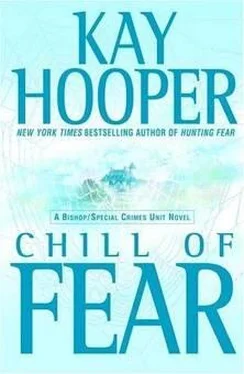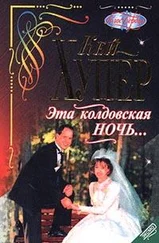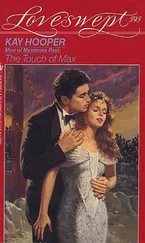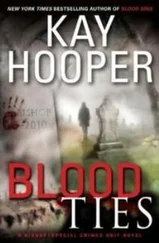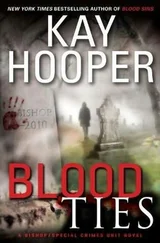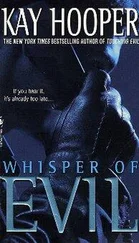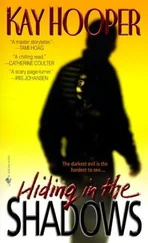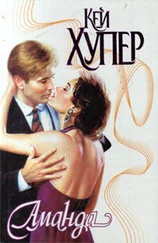He approached Diana warily, more than a little worried because she'd said next to nothing since they had found the photograph in the attic. The photograph she still held in one hand, though she had stopped staring at it to gaze out the window.
Before Quentin could speak, she said in a perfectly composed voice, "You were right, you know, about any magnetized cards I carry not working for long."
He knew she was going somewhere with this, so he followed without question. "Yeah, something about our electromagnetic field affects them."
"The keycards die faster than credit cards."
"Probably because they're rekeyed or remagnetized more than once in a process meant to be fairly temporary."
She nodded slowly. "So the magnetic information on credit cards is intended to be more permanent, and so is more resistant to interference."
"That's our theory."
"And cell phones? They only work for me a week or two and then just die. The cell phone companies can't explain it. I finally stopped trying to carry one."
"Same thing. Our electromagnetic field interferes with anything magnetic or electronic, especially those things that we tend to carry with us or on us most often."
"You carry a cell phone." It was clearly visible, worn on a belt clip.
"We've found a rubberized casing that seems to protect them, at least for a while. The batteries still tend to lose their charge faster than what's considered normal, but at least we have the use of the phones for a reasonable amount of time."
"Ah. I wondered." She paused. "May I borrow your cell phone, please?"
"Of course." He released the phone from its belt clip and handed it over, beginning to have an inkling what she meant to do. He didn't know if it was a good idea, but he also couldn't think of an argument she was likely to listen to right now.
Diana examined the casing protecting his phone for a moment with what seemed idle curiosity, then opened it and tapped in a number, murmuring, "Long distance, sorry. Really long distance, since I think he's at his London office. My taxpayer dollars at work."
Ignoring that, he said, "I can leave, if you'd rather be alone."
She looked at him for the first time. "No. I'd rather you stayed."
Quentin nodded, but he wasn't much reassured. The odd, flat shine that had been visible in her eyes when they were in the caves was back, and the very stillness of her face hinted at something frozen. Something that might shatter at the first wrong touch.
Diana returned her gaze to the window as she waited for the call to go through, then said into the phone, "Hi, Sherry, it's Diana. Is he busy? I need to talk to him. Thanks."
"He works this late?" Quentin asked, having rapidly calculated the time difference.
"He works all hours, seven days a week," Diana replied. "And pays his assistants double overtime to work six."
Quentin wondered if that had always been the case, or if Diana's father had taken refuge in his work when first his wife and then his daughter had tried and seemingly failed to cope with apparent mental problems. But before he could frame the question, Diana's father took her call.
Elliot Brisco, as it turned out, had one of those distinct, powerful voices that was clearly audible on cell phones, so much so that Quentin was easily able to hear both sides of the conversation.
Then again, maybe he was automatically calling on the spider sense to listen with unusual intentness.
"Diana? Where the hell are you?"
"Hi, Dad. How've you been?"
"I've been worried to death about you, Diana, and you damned well know it. That doctor of yours has refused to answer any of my questions, and—"
"I asked him not to tell you where I was, and I asked you to respect that. Besides which, the law agrees my medical information should be confidential. I'm thirty-three, Dad, not a child. And the judge decided I was capable of making my own decisions."
The one statement about a court decision told Quentin a lot. Clearly, Diana had fought for her independence, probably as soon as the medications were out of her system. And just as obviously, her father had not relinquished control over her life willingly.
"You've been ill most of your life," he said now, his voice taking on a hard edge. "Am I not supposed to worry when you suddenly go off all your medications and then disappear God only knows where?"
"I didn't disappear. I told you I was going to try another form of therapy."
"And I wasn't supposed to ask questions about that? Jesus, Diana, with all the crackpots and New Age nonsense out there, you could have been doing any kind of half-assed thing masquerading as therapy. They used to believe LSD was therapeutic, remember?"
"No drugs this time," she said. "I'm not smoking anything. I'm not drinking anything. It's an artistic workshop, Dad, that's all. I've been... painting my demons."
Elliot Brisco made a sound that, to Quentin, indicated either disbelief or withering impatience. "Painting? What the hell is that supposed to accomplish?"
"It accomplished quite a lot, actually. Certainly much more than I expected it to." Diana drew a breath and then let it out slowly, as if for control. "I'm at The Lodge, Dad. In Tennessee. Does that ring a bell?"
"The Lodge. You're at The Lodge." Abruptly, her father's voice was flat, and in that flatness Quentin heard or sensed something a lot like fear.
"Yeah." Diana tilted her head slightly to one side, as if she heard it too, then lifted the hand holding the old photograph so that she could see it. "And I found something here I wasn't looking for. An old picture of two little girls. They don't really favor... and yet they do. When you really look at them, you realize they could be...sisters."
"Diana—"
"It's the photo you carry in your wallet, Dad. Part of it, anyway. Tell me, is the other half torn away, or just folded back out of sight? Did you rip her out of your life, or just tuck her away where you didn't have to look at her?"
Silence.
Diana's voice was quiet but relentless. "Don't you think it's time you told me about Missy?"
Beau Rafferty dismissed his students for the day, and when they'd gone began to gather up charcoal pencils and colored chalks they had used and put them neatly away in boxes and cans. Then he moved from easel to easel, carefully closing the big sketchbooks to allow his students' work some privacy.
He glanced up with a brief frown as a low rumble of thunder sounded, then returned to his worktable to clean a few brushes and put away a much-used set of watercolors. He was still silently debating when he finished, but another distant rumble of thunder made up his mind for him. He searched briefly among the organized clutter on the worktable and found his phone.
The number was programmed into his speed-dial, so he only had to hit one button. And the call was answered before the second ring.
"Yeah."
"There's a storm coming," Beau said.
"Spring in the mountains. Typical weather."
"Uh-huh. I was just wondering if you knew. Ahead of time."
"I've spent time in Tennessee," Bishop said.
"That wasn't really an answer," Beau said judiciously.
"Wasn't it?"
Sighing, Beau said, "Well, I can't say I haven't been warned."
"About what?"
"About you, Yoda."
"According to Maggie, you're the Zen-like master, not me."
"Maybe, but there's something just a little bit spooky about how you do it, pal."
Instead of responding to that, Bishop merely said, "I've been meaning to ask if you're enjoying your first official SCU assignment."
"It has had its moments," Beau said, ruefully accepting the change of subject. "I think I've helped a few of the students, anyway. Do you consider that a plus?"
"It's what I expected." Amusement crept into Bishop's voice. "The whole point of someone like you joining the unit, Beau, is so that you can do what you're best at — painting, and helping others. Whatever you do for me on the side is just a bonus."
Читать дальше
